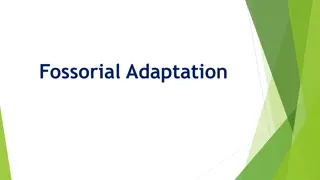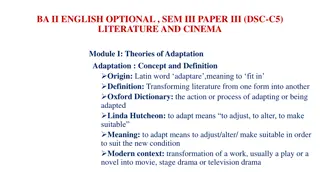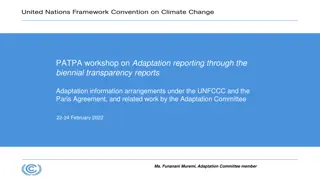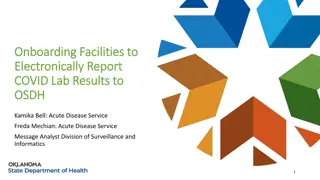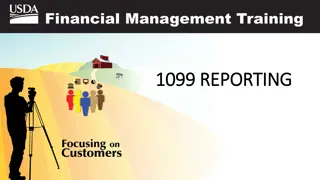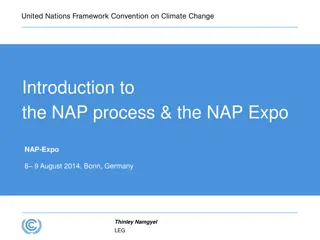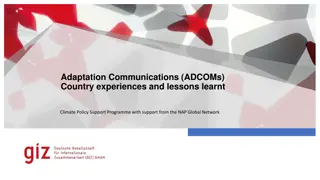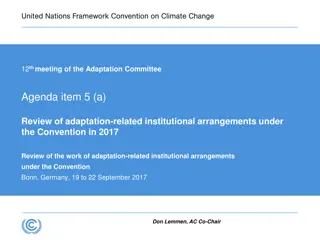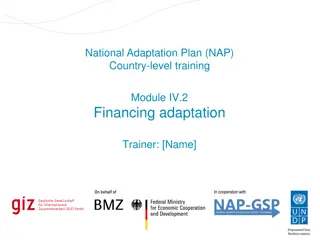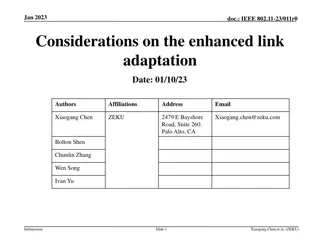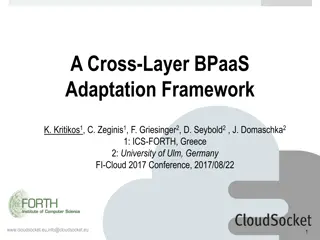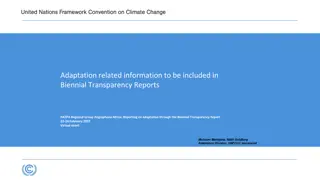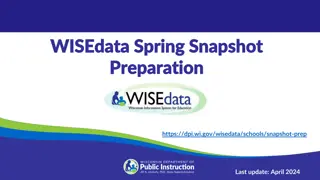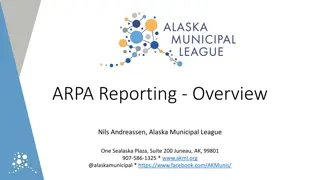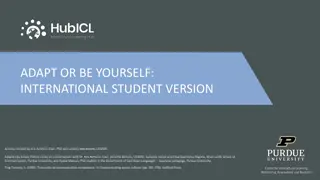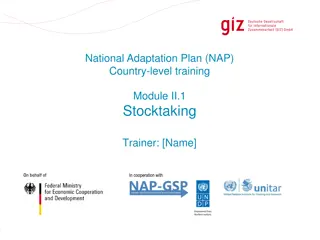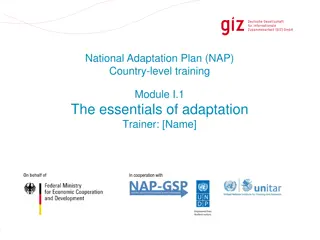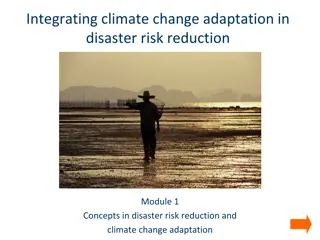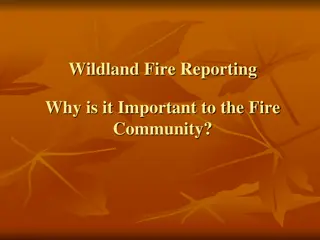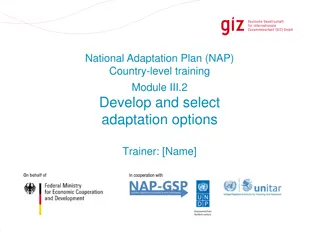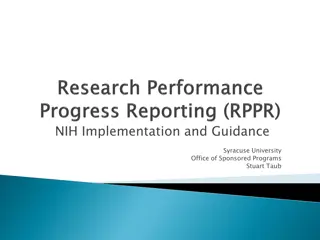Understanding the Urgency of Adaptation Planning and Financing for Climate Change
Exploring the critical need for adaptation planning and financing through National Adaptation Plans (NAPs) and Nationally Determined Contributions (NDCs) to address the adverse impacts of climate change. The content highlights the gaps, challenges, and the widening finance deficit in developing coun
2 views • 21 slides
ECC Social Value Reporting and Evaluation Framework
Essex County Council (ECC) has implemented a robust Social Value Reporting and Evaluation framework based on the Local Government Association's National TOMs method. This framework categorizes and assesses social value contributions in two parts - Value Score and Supporting Statement Score - to deri
3 views • 16 slides
Climate Change Adaptation Toolbox for Schools and Communities
Climate Change Adaptation Toolbox offers resources to understand and address the impacts of climate change on schools and communities. It provides information on changing climates, implications, and actionable steps to mitigate risks. The toolbox supports education on climate change and facilitates
5 views • 6 slides
Sustainable Financing for Climate Adaptation: Mexico's Innovative Approach
Mexico's Ministry of Finance is pioneering sustainable financing for climate adaptation through policy instruments like the Sustainable Taxonomy. The country's focus on mobilizing financing for adaptation, in line with NAPs and NDCs, showcases a unique global leadership in incorporating social objec
5 views • 4 slides
Gaps and Guidance for National Adaptation Plans (NAP-GGGP)
The University of Twente and the Global Green Growth Institute present a comprehensive study on National Adaptation Plans (NAP-GGGP) focusing on best practices, guidelines for development, and lessons from plan evaluations at local levels. The NAP-GGGP framework includes 7 categories with 56 element
3 views • 10 slides
Understanding Fossorial Adaptation in Animals
Animals adapt to subterranean environments through anatomical and physiological modifications in a process known as fossorial adaptation. This adaptation involves creating subterranean zones through digging, leading to changes influenced by both the environment and the animals themselves. Fossorial
0 views • 17 slides
Theories of Adaptation in Literature and Cinema
The concept of adaptation involves transforming literature from one form to another, such as from a play or novel into a movie or television drama. Various approaches and theories of adaptation exist, including perspectives from theorists like Linda Hutcheon, Bela Balazs, and Andre Bazin. These theo
0 views • 9 slides
Workshop on Adaptation Reporting under the UNFCCC and Paris Agreement
Workshop on Adaptation Reporting through the Biennial Transparency Reports and related work by the Adaptation Committee under the UNFCCC and the Paris Agreement, focusing on arrangements for reporting and communicating adaptation information. The workshop covers various initiatives, guidelines, and
0 views • 7 slides
Exploring Adaptations of Reef Specialists
Delve into the evolution and adaptation of reef specialists in Lesson 5 of Coral Oceans at Home Science for ages 11-14. Discover specific adaptations used by coral reef species, the necessity of adaptation for survival, diverse adaptation strategies on the reefs, and create the ultimate coral animal
0 views • 20 slides
Streamlining Electronic Reporting of COVID Lab Results to OSDH
This documentation outlines the process of electronically reporting COVID lab results to the Oklahoma State Department of Health (OSDH). It covers the purpose, available options, specifications, formats, and the onboarding and testing process, aiming to accelerate the reporting of healthcare facilit
0 views • 9 slides
Overview of 1099 Reporting Systems
The 1099 Reporting Systems consist of MINC, EARN, and SPPS, which are used for IRS 1099 reporting purposes. These systems handle transactions and generate Form 1099 for recipients based on predefined criteria. Taxpayers are responsible for accurate reporting to the IRS, with reporting thresholds set
0 views • 15 slides
Gender and Climate Change in Agriculture: Impacts and Adaptation Strategies
This workshop explores the intersection of gender and climate change in agriculture, emphasizing the importance of considering gender dynamics in adaptation planning. It covers the effects of climate change on men and women in agriculture, reasons for gender-sensitive adaptation planning, global and
0 views • 10 slides
Climate Change Adaptation Programming Strategy and Priorities
This content discusses the Climate Change Adaptation programming strategy, goals, and thematic priorities for vulnerable developing countries. The strategy aims to increase resilience to climate change impacts through long-term measures, strengthen capacities, and integrate adaptation into policies
2 views • 6 slides
Understanding the National Adaptation Plan Process
The National Adaptation Plan (NAP) process, established in 2010, aims to help Least Developed Countries (LDCs) formulate and implement NAPs to address medium- and long-term adaptation needs. Guidelines for NAP formulation and implementation have been provided, with a focus on reducing vulnerability
0 views • 11 slides
Understanding Adaptation Communications in Climate Policy Support Programs
Adaptation Communications (ADCOMs) play a crucial role in the implementation of the Paris Agreement by enabling countries to report on their adaptation priorities, plans, and support needs without burdening developing country Parties. ADCOMs serve to enhance visibility, strengthen adaptation actions
2 views • 13 slides
Review of Adaptation-Related Institutional Arrangements Under the Convention in 2017
The 12th meeting of the Adaptation Committee in Bonn, Germany, focused on reviewing adaptation-related institutional arrangements under the Convention in 2017. Recommendations were made to enhance coherence and respond to the evolving needs of Parties, including assigning future work to existing ins
0 views • 4 slides
UNEP Support for Improving UNCCD Reporting Procedures
UNEP has been providing support since 2010 to enhance the reporting processes of the UNCCD, focusing on streamlined funding approaches, technical assistance, and capacity building. Key outcomes include the development of reporting tools, online reporting systems, and building credible data from coun
0 views • 14 slides
The Role of the Adaptation Committee in Promoting Adaptation Technologies
The Adaptation Committee serves as an advisory body focusing on enhancing adaptation actions under the Convention. It aims to provide support, share information, promote synergy, and offer recommendations to incentivize adaptation actions. The committee's ambitious three-year work plan includes acti
0 views • 7 slides
Climate Change Monitoring, Reporting, and Verification (MRV) Training Session Overview
This document outlines the purpose and reporting requirements for the development of a Climate Change Monitoring, Reporting, and Verification (MRV) system, focusing on projections and scenarios. It highlights the importance of collecting information for climate mitigation, assisting Serbia in meetin
0 views • 19 slides
Cultural Adaptation: Understanding Culture Shock and the Adaptation Process
Cultural adaptation involves facing culture shock when living abroad, experiencing various symptoms like homesickness and conflict, understanding cultural variations in body language and perceptions, and going through stages of adaptation from fun and excitement to biculturalism. Tips and insights a
0 views • 17 slides
Transitioning to Incident-Based Crime Reporting: Enhancing Transparency and Accountability
Anytown Police Department (APD) is leading the transition from Summary Reporting to Incident-Based Reporting through the National Incident-Based Reporting System (NIBRS). This change promotes transparency, provides detailed crime data to the public, and improves statewide and national crime statisti
3 views • 17 slides
Insights into Structured Reporting Practices in Colorectal Cancer Imaging
A survey conducted by Dr. Eric Loveday at North Bristol NHS Trust revealed the current landscape of structured reporting in MRI and CT scans for rectal and colon cancer. Results indicate a positive outlook towards implementing national standards for structured radiology reporting, with an emphasis o
0 views • 7 slides
Understanding Climate Financing for Adaptation: NAP Country-Level Training
Explore Module IV.2 on financing adaptation in National Adaptation Plans (NAP). Learn about tracking climate financing, determinants of financing strategies, potential funding sources, and activities that require funding for adaptation. Discover the Climate Public Expenditures and Institutional Revi
0 views • 17 slides
Enhancements in Link Adaptation for IEEE 802.11 Standards
Discussions in the Jan. 2023 document focus on enhanced link adaptation considerations for IEEE 802.11 standards, particularly in 11be and 11ax. Various improvements and challenges in link adaptation are highlighted, emphasizing the need for enhanced link adaptation (ELA) to address issues like inte
0 views • 14 slides
A Cross-Layer BPaaS Adaptation Framework Overview
This framework addresses the problematic issues of flexibility and cost reduction in Business Processes as a Service (BPaaS) by monitoring and adapting BPaaS in a cross-layer manner. It focuses on handling the entire lifecycle of BPaaS and covers adaptation mechanisms for different layers in the clo
0 views • 17 slides
Reporting on Adaptation in Biennial Transparency Reports: Insights from Anglophone Africa
Explore the integration of adaptation-related information in Biennial Transparency Reports for Anglophone Africa, presented during a virtual event. Learn about key guidelines, criteria, and potential synergies between National Adaptation Plans and Biennial Transparency Reports to enhance effectivene
0 views • 10 slides
Simpler Systems Reporting Pilot for Financial Data Enhancement
The Simpler Systems Reporting Pilot is underway to enhance financial data reporting at the university campus. Led by Vice President Ryan Nesbit's team, this initiative aims to improve University-wide financial reporting mechanisms and accessibility to data through the Simpler tool. The pilot include
0 views • 5 slides
Overview of WISEdata Snapshot Preparation and Reporting Requirements
The WISEdata Snapshot Preparation provides crucial details on data entry, validation, and reporting processes for educational institutions. It outlines the importance of accurate data collection for federal reporting, public reporting, and funding determinations. Additionally, the Snapshot Reporting
0 views • 41 slides
Ensuring Chemical Reporting and Preparedness at the DEQ
The Chemical Reporting and Preparedness section at the DEQ focuses on regulations under EPCRA, prompted by incidents like the Bhopal tragedy. EPCRA covers Tier II reporting, spill reporting, LEPCs, State Emergency Response Commission, and Oklahoma Hazardous Materials Emergency Response Commission. T
0 views • 17 slides
ARPA Reporting Overview and SLFRF Guidelines in Alaska
This document outlines the reporting overview for the ARPA (American Rescue Plan Act) and specific guidelines for the Coronavirus State and Local Fiscal Recovery Fund (SLFRF) in Alaska. It covers acceptance, use, and reporting of funds, as well as designating staff roles for managing reports. The co
2 views • 22 slides
Sustainable Adaptation Strategies in Ghana: Insights from the PATPA Regional Workshop
Explore key highlights from the virtual workshop organized by the PATPA Regional Group in Anglophone Africa, focusing on adaptation reporting in Ghana, including NDCs, NAPs, and NATCOMs. Learn about the significance of the Standalone ADCOM in enhancing institutional structures and governance arrange
0 views • 4 slides
Understanding Adaptation Across Cultures
Explore the concept of adaptation in diverse cultural contexts, discussing the importance of adapting, decision-making processes, and the impact of adaptation. Engage in introspective activities to enhance transcultural communication competence. Derived from Ting-Toomey's work, delve into personal e
0 views • 38 slides
National Adaptation Plan (NAP) Stocktaking Training Overview
This training module provides insights into the importance of stocktaking in the National Adaptation Plan (NAP) process. Participants will learn about different stocktaking methods, utilizing stocktaking results for NAP development, and identifying gaps and needs. The session covers subjects like po
0 views • 14 slides
Feedback Analysis on Medication Incident Reporting in Hospitals
Feedback received from IMSN members on NIMS and incident reporting revealed various issues affecting the rates at which staff report medication incidents/near misses within hospitals. Major themes included staffing numbers and turnover, pharmacist involvement in incident reporting, clinical pharmacy
0 views • 12 slides
Essential Training on National Adaptation Planning
This training module focuses on enhancing understanding and capacities for National Adaptation Planning (NAP) processes. It covers the basics of climate change, adaptation concepts, challenges, and the importance of adaptation for development. Through interactive sessions and case studies, participa
0 views • 16 slides
Integrating Climate Change Adaptation in Disaster Risk Reduction Module 1
Welcome to the e-Learning module on integrating climate change adaptation in disaster risk reduction. This module covers concepts in disaster risk reduction and climate change adaptation. It is part of a package that includes five modules focusing on vulnerability, disaster risk reduction, climate c
0 views • 29 slides
Importance of Wildland Fire Reporting to the Fire Community
Wildland fire reporting plays a critical role in providing accurate data for effective fire management. Defined state fires and challenges in reporting impact funding, risk management, and agency support. Comprehensive reporting like the Wildland Fire Occurrence Reporting for Massachusetts is essent
0 views • 6 slides
Climate Change Adaptation Programming Strategies and Priorities
This content discusses the Global Environment Facility's (GEF) programming for climate change adaptation, focusing on strategies, funding sources, and thematic priorities. It outlines the goals, objectives, and core pillars of adaptation programming, emphasizing the integration of climate change ada
0 views • 11 slides
Developing and Selecting Adaptation Options in National Adaptation Plans: A Training Module
This training module focuses on the importance of selecting and prioritizing adaptation options in the National Adaptation Plan (NAP). It covers different assessment approaches, criteria for selecting options, decision support tools like Cost-benefit Analysis (CBA), and the necessity of prioritizing
0 views • 15 slides
Streamlining Research Progress Reporting for NIH Awards
Research Performance Progress Report (RPPR) is a standardized mechanism to facilitate interim progress reporting for NIH-funded projects, aiming to enhance consistency and minimize administrative burdens. It replaces the eSNAP process for certain types of awards and fellowship grants. RPPR includes
0 views • 12 slides





